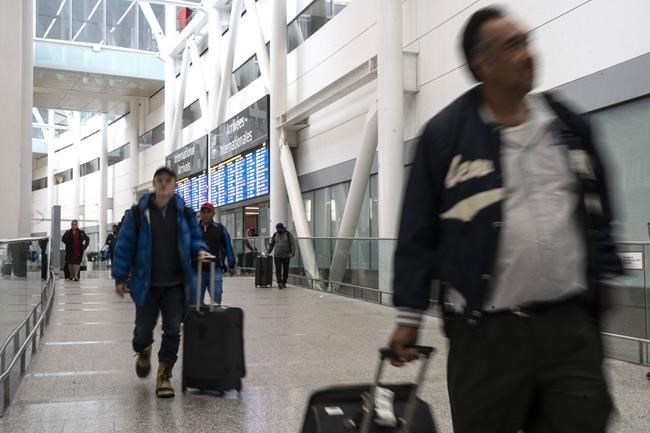TORONTO — Aiming to prevent the chaos that travellers experienced last year when flying in and out of Canada's busiest airport, Toronto Pearson International has bolstered staffing and made technological improvements ahead of this year's summer surge.
The Greater Toronto Airports Authority (GTAA) said Monday it is better prepared for the summer travel rush to ensure passengers don't face widespread delays and cancellations in the coming months.
"This summer will be very different and better than summer of 2022," said GTAA president and CEO Deborah Flint.
"Our focus has been to rebuild the trust, to regain the confidence of our customers, to bring reliability and predictability to air travel."
Since last summer, the airport has hired 10,000 new employees, giving it 22 per cent more staff, or 50,000 workers in total. The increase includes the hiring of 130 new staff announced last week to help in critical areas such as busing, baggage handling and terminal operations.
Flint said staffing levels are equivalent to 2019 as the airport expects about 80 per cent of the summer traffic it saw before the pandemic — a 10 per cent bump over last year.
She acknowledged the "anxiety" and "lack of control" felt by passengers last summer, calling it a unique travel season as traffic soared by 180 per cent after many pandemic restrictions were eased.
The surge led to overflowing baggage halls, stranded passengers and tens of thousands of flight cancellations, along with some complaints of passengers being stuck on the tarmac for more than an hour before unloading — an issue Flint said would not be repeated this summer thanks to the easing of health processing requirements at customs.
"It was a slingshot of a recovery last year," she said.
"Our partners are simply more ready. It's a more normal summer than it has been."
Flint noted the airport's on-time flight performance so far this year sits at 70 per cent, which included a smoother March break travel season, following an on-time performance of 35 per cent seen in summer 2022. Earlier this year, the GTAA capped the number of flights coming into and out of Pearson during peak travel periods in attempt to reduce traffic.
She said airport systems have also been modernized in preparation for the summer demand. Pearson has streamlined its contactless check-in and boarding processes through a new partnership with the Canada Border Services Agency to deploy biometric e-gates and expedite customs clearance for travellers.
It has also implemented an upgraded baggage system relying on AI designed to anticipate overloading and detect potential breakdowns before they occur.
Meanwhile, Flint touted a new standard to better understand airlines' readiness and contingency plans. She said the GTAA will gather data to hold airlines accountable on proper training and staffing availability when handling baggage, with the goal of reducing baggage recirculation, maintaining system capacity and reducing delays at check-in and departure.
Wayne Smith, a hospitality and tourism management professor at Toronto Metropolitan University, called the measures a step in the right direction.
"There's a long way to go. Is it going to be perfect? No. But is it going to be a marked improvement? Probably," he said, adding that the pandemic turnover of staff essentially forced airports like Pearson to "start from scratch" as passenger volumes rebounded in 2022.
"That probably explains about 70 per cent of the problems last summer," he said.
"The thing about airports is they're not easy for people to work at. It's not an easy place for people to get to, you're often dealing with the public when they're highly stressed. It's a very difficult place to train for."
Gabor Lukacs, president of the Air Passenger Rights advocacy group, said he was encouraged by the Toronto airport's plan but cautioned that travellers should "check against delivery."
"What I would like to see is monthly reports from the Toronto airport about how these measures are helping, how it's affecting people, how it's actually working in practice," he said.
"Because I think they are on the right path here. We just need to make sure that the airport is not put under undue pressure by the airlines and various other players to deviate from this plan."
Lukacs blamed airlines for much of the confusion at Pearson last summer, saying they oversold tickets relative to the airport's staffing capacity at the time.
"One can complain about how understaffed the airport is, but at the end of the day, it is the airline that has to take into account the reality of what the airport is conveying," he said.
Flint conceded that air travel won't be perfect despite the improvements, due to "pandemic spillover effects like labour softness," along with issues caused by weather conditions.
"It is still travel after all," she said.
"We know irregular operations are going to happen and passengers need to have faster, better information around flight delays or potential cancellations. Airlines and agencies are sharing more with us and with passengers as well."
Disruptions could include a potential strike by WestJet pilots as early as May 16 — the Tuesday ahead of the May long weekend, which typically kicks off the summer travel season. The union representing WestJet pilots voted overwhelmingly in favour of a strike mandate last month.
Asked if the airport has a contingency plan for that scenario, Flint said the GTAA is making its partners ready for a potential disruption.
Pilots represented by the Air Line Pilots Association held an "informational picket" on Monday at airports in Toronto, Calgary and 91įŁ┤┤ "to show WestJet management they remain committed to negotiating a North American industry-standard contract," the union said in a press release.
— With files from Kiernan Green in Toronto
This report by The 91įŁ┤┤ Press was first published May 8, 2023.
Sammy Hudes, The 91įŁ┤┤ Press



